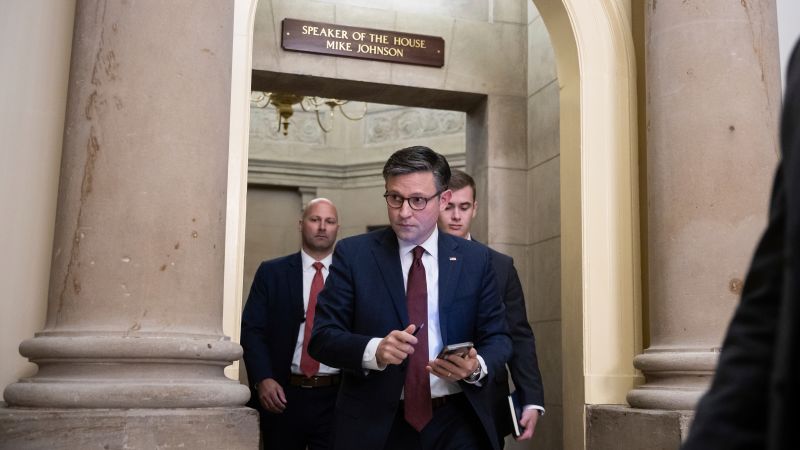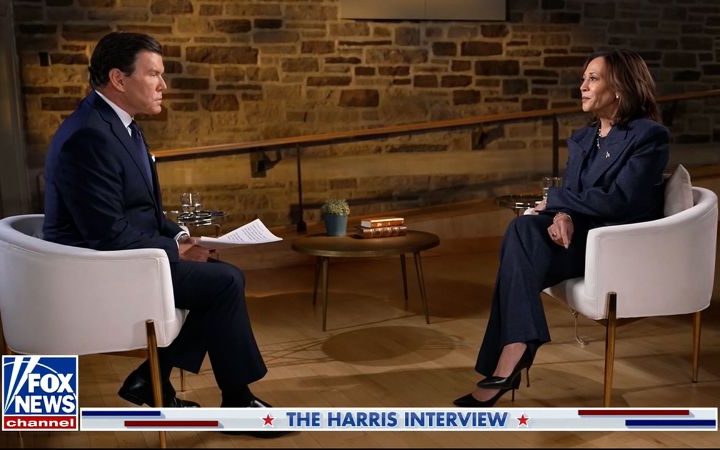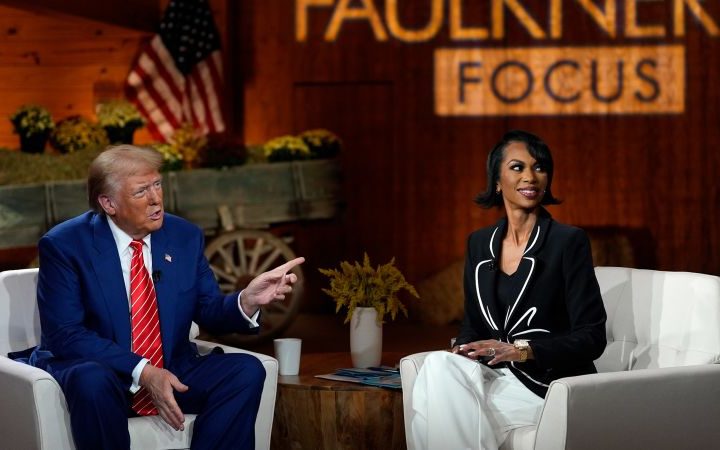The House’s struggle to send $14 billion in emergency aid to Israel is exposing political rifts that leave America looking like a divided super power unable even to rush help to a friend that believes it’s fighting an existential war.
A vote on the package had been expected on Thursday, though that timeline now appears at risk of slipping, as the country’s political schisms and a fractured foreign policy consensus once again threaten to paralyze governing.
It shouldn’t be this hard.
For years, a vote on aid to Israel might have been one of the least controversial measures to come up in the House all year. But delays in moving the measure, the fragile balance of power in Washington and feuds between and inside both parties over the new Middle East war show that there’s no longer any easy vote.
The commotion around the issue largely centers on newly elected House Speaker Mike Johnson’s decision to pay for the $14.3 billion in aid to Israel with an equal amount of cuts from the budget of the Internal Revenue Service. This is popular with conservatives but means that many Democrats will vote against what they see as a political stunt.
The Israel package is also being dragged deeper into the political mire because President Joe Biden chose to include it in a much broader request that includes the next tranche of arms and ammunition for Ukraine. Johnson’s conference opposes some aspects of the ask for funding north of $100 billion. And while the speaker is moving an Israel bill on its own, the Senate may insert Ukraine aid and send it back to the House, further delaying the dispatch of US assistance to Israel amid its war with Hamas.
The debate is revealing multiple subplots in national politics a year out from the next election. And it is painting exactly the kind of picture of American dysfunction that adversaries like China and Russia leverage in their attempts to weaken US power.
— Johnson’s strategy shows how an extreme right-wing GOP conference is ready to play hardline politics even on issues that have a critical global impact. His decision to include IRS offsets also makes clear that like his ousted predecessor Kevin McCarthy, the Louisiana Republican cannot guarantee a functioning GOP majority without making concessions to its most hardline members. But these moves are unlikely ever to be accepted by the Democratic-led White House or Senate so they are ultimately futile. For instance, Biden has already vowed to veto the current House bill in the unlikely event it ever reaches him. But Johnson is going ahead — already raising the possibility that he’s being led by extreme elements of his party rather than the other way around.
— The speaker could emerge strengthened if he is able to navigate the bill into law without further delays. But he also risks navigating himself into a position that ruptures his authority before he has built an effective political foundation. While his IRS gambit could win sufficient GOP votes to pass the bill, it won’t change the reality of shared power in Washington. Sooner or later he’ll have to produce a measure that can win support in a Democratic-run White House and Senate. That could require him to rely on some Democratic votes for final passage — the very scenario that outraged extreme right GOP members and led to the fall of McCarthy, causing three weeks of farcical power vacuums in the House. And if the vote timetable on Israel does slip, Johnson will waste even more time just two weeks ahead of a threatened government shutdown that can only be averted by a funding bill that will be even harder than an Israel measure to pass.
— The aid debate is also exposing the huge rift inside the Republican Party over foreign policy between Make America Great Again isolationists and the old school establishment that still advocates robust global leadership through alliances that helped secure global peace since World War II. Johnson’s maneuvering – in loading down the Israel bill with political priorities and separating it from Ukraine funding – has created a rift with Senate Minority Leader Mitch McConnell, a staunch conservative, but who is closer to Biden than his own party in the House on the issue. “Over and over again, history has taught us that the costs of disengaging from the world are far higher than the costs of engaging,” McConnell said Wednesday, before Johnson crossed the Capitol and lunched with Republican senators. “As foolish as it is to deny the clear link between America’s adversaries and the threats we face, it’s every bit as dangerous to pretend that as a global superpower, our nation could not or should not face each of them down.”
— As McConnell suggested, the related showdown over aid to Ukraine is also exposing the chasm inside the GOP and showcasing the broader question of whether the United States and its people are prepared to continue to be a bulwark for global democracy. This is a question at the core of a possible general election clash between Biden, an internationalist whose worldview was forged in the Cold War, and former President Donald Trump, a transactional leader who views alliances more as protection rackets than multipliers of American global power. After all, the fundamental question at issue on Ukraine is whether the US will continue to stand for the independence of a country whose right to exist is being threatened by a ruthless invasion planned in the Kremlin. Large numbers of Republicans in the House and an increasing number in the Senate do not view Ukraine as a vital US foreign policy interest — leaving some appearing to prefer Russian President Vladimir Putin to democracy in Kyiv.
Ukraine’s supporters in Congress saw some reason to hope, however, after Johnson on Wednesday attended the weekly Senate policy lunch. The Louisiana lawmaker has long expressed skepticism over Ukraine aid but appeared to indicate that he realized he had wider duties as speaker beyond his own political preferences. Johnson told Fox News last week that the US shouldn’t abandon Ukraine to Putin. Oklahoma Sen. Markwayne Mullin told reporters that the rookie speaker indicated an openness to passing Ukraine funding if it had support from House Republicans. And South Carolina Sen. Lindsey Graham, an advocate for helping the war-torn country, said he was “blown away” by the speaker’s foreign policy acumen. But the last few weeks have shown there’s a vast difference between what a GOP wants to do and what he can do. There’s unlikely ever to be sufficient support to pass Ukraine funding by using the Republican majority alone. So he will be back to needing Democratic help that could fatally wound his speakership.
— While Republican schisms on foreign policy are getting most of the headlines, the domestic political aftershocks of Israel’s war with Hamas are becoming an increasing problem for Biden. Some prominent progressives are becoming more and more critical of Israel’s tactics in Gaza where hundreds of civilians have been killed in what Israel says are targeted raids against leaders of the Islamist militant group. The debate in the House chamber over the aid package for Prime Minister Benjamin Netanyahu’s government will drive Democratic tensions to the surface.
The president came face-to-face with such anger during a trip to Minnesota on Wednesday when a protester who identified herself to reporters as Rabbi Jessica Rosenberg started chanting “ceasefire now.” Biden explained that he favored a humanitarian pause in Israeli operations to allow time for the release of hostages in Gaza and said he understood the “emotion.” But he has refused to publicly call on Israel to agree to a ceasefire with Hamas, reasoning that it has a right to defend itself after the October 7 terrorist attacks that killed 1,400 people in Israel, most of them civilians.
The president is in a perilous political position a year ahead of the election, and can ill afford low turnout among progressive and Muslim voters who favor the Palestinians in swing states like Michigan. In an apparent sign the White House understands the potential political risks, the president unveiled plans for a new strategy to counter Islamophobia in the United States Wednesday. The initiative could expose Biden to attacks from Republicans at a time when the country is being rocked by growing antisemitism. But the conflict in the Middle East is leaving the president with a new set of tricky political hazards to navigate at home.
Read the full article here







